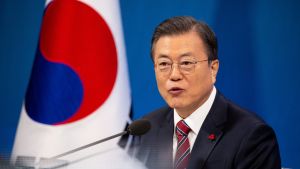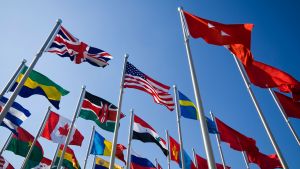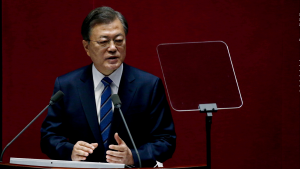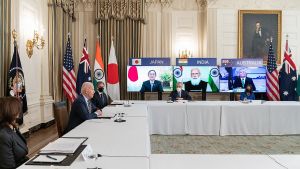A report from the Task Force on Trilateral Cooperation Amid China’s Rise recommends a new policy mix that leverages each country’s individual strengths and advantages.
Executive Summary
The US-China relationship will be one of the most important in defining the international order in the 21st century. As the two countries enter an increasingly competitive phase in relations, both must manage the policy mix of confrontation, competition, and cooperation. If mismanaged, competition could quickly tilt toward miscalculation and armed conflict. For the United States, a poor mix of these policy elements could also lead to a hastened US decline, rapidly ceding the Asia-Pacific to China’s leadership, leaving regional allies at risk of coercion under the threat of China’s military and economic power.
The nature of the challenge posed by China, the economic interdependence in the region, and serious questions about US leadership necessitate a fundamental reevaluation of trilateral cooperation. Effective US policy in the region hinges on getting policy right with the two most important US allies in the region—Japan and South Korea. While alliances are among the most important advantages the United States holds in its competition with China, South Korea and Japan hold particular importance given the values they share with the United States, as well as their dynamic economies, growing military capabilities, influence in the region, and geostrategic location. But the inherent advantages of these allies can only be drawn upon if the United States recommits itself to the region and to investing in and upholding these long-standing relationships.
The persistent doubts about US commitment to and leadership in the region involve not only political will and competence but growing questions of economic feasibility as well. Doubts about the United States are leading Japan and South Korea to consider all options in terms of their security. Unlike the Cold War with the Soviet Union, the United States will not be able to draw a line in the sand, demand that its allies and partners toe that line, and still expect to compete effectively. Such an approach will further erode US credibility and confidence in US leadership.
This reality will necessitate a deep mutual trust between the trilateral partners and greater tolerance for the distinct needs and interests of all three countries. A better understanding of how each country views its role in the region, its relationship with China, areas of cooperation, and the limits for each country in dealing with China is vital.
To that end, we make the following recommendations:
Confront China’s Economic Coercion
A core concern for Japan and South Korea is China’s use of economic coercion. Beijing has wielded economic pressure against both countries for perceived transgressions. As those coercive campaigns took place, the United States was perceived as providing too little support, leaving its allies to face the brunt of China’s ire alone. Economic coercion will likely remain a standard tool in China’s repertoire, and the trilateral partners need to be better prepared for future attempts at such coercion. A coordinated plan to deal with China’s coercive campaigns will also expand the willingness of countries to resist China when necessary by reducing the fear of becoming a target.
- Coordinate more closely on confronting China’s economic coercion: Governments in all three countries must strengthen coordination when faced with potential economic coercion. Japan and South Korea should take an active role in sharing lessons learned with other countries targeted by China. The three countries should also explore establishing a more formal coordinating body to help shape the response to China’s coercive economic practices. These measures could include temporary tariff reductions, targeted purchases of affected items, and other forms of support for targeted industries and companies. These discussions should also go beyond the United States, Japan, and South Korea. Australia would be a strong candidate for inclusion given its recent targeting by China.
- Reform the World Trade Organization (WTO), don’t handicap it: The WTO should become an important venue for the trilateral partners—and other countries—to present a united front against China’s economic coercion. First, the administration of US President Joe Biden should reverse its continued freeze in appointing new appellate body members. Second, the trilateral partners should strongly consider filing third-party submissions before the WTO—and encourage other countries to do so as well—when China’s coercive tactics are challenged there. Third, the United States, South Korea, and Japan should work to create a broad coalition of countries ready to reform the WTO to ensure it is functioning as intended.
Cooperate on Issues, Allow for Alliance Flexibility
Unilateral demands from the United States for Japan and South Korea to adhere to US policy mandates on China will undermine cooperation and damage the alliances, leading to a fragmented, conflictual region. Instead, the United States will need to better understand and incorporate the positions of Japan and South Korea into its own policy-making process. Their economic and security interests will mean, at times, that their respective approaches to China will differ from the preferred US approach.
- Restate alliance values and principles and reinforce them whenever possible: The respective alliances with Japan and South Korea have grown beyond security guarantees. They have come to encompass the core values of democracy, human rights, and free trade. The public in South Korea agree. A majority (54%) say the alliance with the United States is based on security interests and shared values. In Japan, however, there may be more work to do on framing the alliance for the public. Just 26 percent say the alliance with the United States is based on security interests and shared values. While flexibility will be required to address the challenge to the alliances posed by China’s rise, all three countries should continue to reinforce their commitment to the shared values of democracy, human rights, and open economies. These values form the bedrock of the alliances and cannot be abandoned.
- Create opportunities for cooperation that are not focused on China: Building a coalition overtly focused on China will further the narrative that the goal of the United States and its allies is to destroy China’s regime. That will ultimately be counterproductive, encouraging China to harden its positions rather than seeking cooperation when possible. There are ample opportunities for the trilateral partners—often working with other like-minded countries—to cooperate in other areas. Health, education, development, and combatting pandemics are all issue sets where trilateral know-how and interests converge. Japan, South Korea, and the United States also have significant overlap on goals and priorities in Southeast Asia that will allow them to work together in ways that advance shared goals that are nonthreatening to China.
- Recognize the inherent tensions between South Korea and Japan: Tokyo and Seoul may share democratic governments and alliances with the United States, but they are not natural partners as often claimed. Historical mistrust between them makes cooperation politically difficult. However, the security communities in both countries understand that shared threats require cooperation. And with majorities of South Koreans (59%) and Japanese (80%) saying China is a rival rather than a partner, there may be more room to build cooperative approaches between the two nations. Already, publics in both countries support cooperating on development projects in Southeast Asia (58% support in Japan, 62% in South Korea) and sharing intelligence on North Korea’s nuclear and missile programs (73% support in Japan, 53% in South Korea). In addition, the countries should explore—and the United States should encourage or participate in—multilateral antipiracy operations in places like the Gulf of Aden, antisubmarine exercises in the Indian Ocean, and maritime cleanup in the South China Sea.
Compete with China, Coordinate with Allies in Southeast Asia
In Southeast Asia, the primary focus of the United States has been on ensuring that sea lanes traversing the South China Sea remain open to all naval traffic. However, the military focus on the region as a strategic choke point is not matched by a corresponding diplomatic and financial effort. The United States and allies should match the attention given to the sea lanes with a renewed focus on addressing issues that will benefit the governments, people, and businesses in the ASEAN region.
- Compete broadly in services, narrowly in big infrastructure investment: Building big infrastructure may help get goods and people from place to place, but the benefits of that infrastructure do not automatically reach the communities that surround those newly built environments. Reaping those advantages requires better access to services like internet connectivity, education, health, and legal services. The trilateral partners should seek to harness their shared competitive advantage in services to work around newly created hard infrastructure and invest in opportunities in cities and communities across the region. Big infrastructure investment should not be wholly abandoned, but it should be done as a complement to the competition in services.
- Use the Development Finance Corporation (DFC) and the Asian Development Bank as organizing pillars: Established by the BUILD Act, the DFC offers a new way for the United States to deploy its development budget and coordinate with other countries in doing so. The DFC should work with the relevant organizations in Japan and South Korea to pursue investments in development projects, sustainability, and climate initiatives, small- and medium-sized enterprises, and women-owned businesses throughout ASEAN countries. All three countries are already active in the region, but these activities are not well coordinated. Interests may not always align, but where they do, the combined efforts will have broader impact in a critical region. These efforts should be closely coordinated with the activities of the Asian Development Bank and its 2030 strategy to help broaden the scope of investment in the region to include quality infrastructure to help mitigate effects of climate change, water insecurity, and poor sanitation.
- Utilize the advantage in public diplomacy: China’s BRI activities in the region attract the most attention, but those activities are creating nervousness and pushback in several recipient countries. Meanwhile, Japan remains the largest funder of infrastructure in ASEAN, and South Korea’s cultural products are paving the way for a rapid expansion of its presence in the region. The trilateral partners should take advantage of this opportunity to exercise their considerable influence to establish a new narrative throughout the region that focuses on economic opportunity, societal openness, and environmental sustainability.
Acknowledgments
This task force was made possible by the generous support of the Carnegie Corporation of New York, the Korea Foundation, and the Nakasone Peace Institute. The content of this report reflects the overall discussions of the task force, though some task force members may have views that differ with some of the recommendations.
Task Force Cochairs
- Fujisaki Ichiro, Nakasone Peace Institute
- Han Sung Joo, Asan Institute for Policy Studies
- James Steinberg, Syracuse University
Task Force Members
- Choi Young-jin, Yonsei University
- Chung Jae Ho, Seoul National University
- Ivo Daalder, Chicago Council on Global Affairs
- Bonnie Glaser, German Marshall Fund of the United States
- Hashiba Ken, Nakasone Peace Institute
- Nishino Junya, Nakasone Peace Institute
- Kim Sung-han, Korea University
- Kubo Fumiaki, Nakasone Peace Institute
- Daniel Russel, Asia Society Policy Institute
- Sheila Smith, Council on Foreign Relations
- Tokuchi Hideshi, Nakasone Peace Institute
- Tsugami Toshiya, Nakasone Peace Institute
Project Director
- Karl Friedhoff, Chicago Council on Global Affairs
Related Content
 Public Opinion
Public Opinion
Chicago Council survey data find majorities in South Korea view China as more of a security threat than a security partner and as more of an economic threat than an economic partner.
 Public Opinion
Public Opinion
Chicago Council and Asan Institute surveys conducted in 2019 find that both South Koreans and Americans see a strengthened US-ROK alliance as an asset in dealing with China, suggesting that Washington and Seoul can afford to strengthen coordination between their policies toward China.
 Public Opinion
Public Opinion
Karl Friedhoff examines South Korea's careful negotiation of its security alliance with the United States, along with its economic dependence on China.
 Public Opinion
Public Opinion
Craig Kafura and Karl Friedhoff analyze findings of a recent poll examining American public opinion on US relations with Japan.
